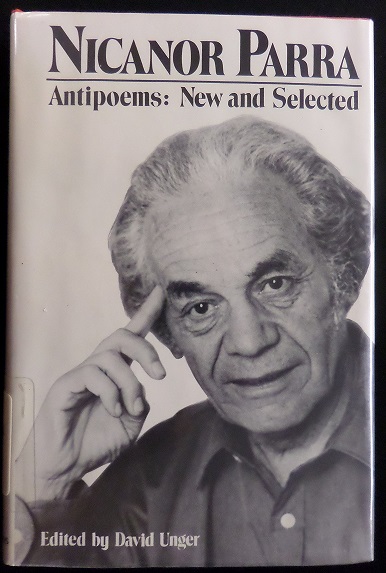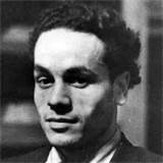Antipoems: New & Selected by Nicanor Parra. New York. 1985. New Directions. hardcover. 208 pages. Jacket photograph by Layle Silbert. design by Denise Breslin. Edited by David Unger Various Translators From The Spanish. 0811209598.
 FROM THE PUBLISHER -
FROM THE PUBLISHER -
ANTIPOEMS: NEW AND SELECTED, a fresh bilingual gathering aswell as retrospective of the work of Chile’s foremost poet, reintroduces him to North American readers after thirteen years. Though he has been hardly unproductive, the politics of his homeland have channeled his inventiveness into new modes of expression, which remind us of the sometimes sly hermeticism of Italian writers, Eugenio Montale and Elio Vittorini among them, during the Fascist regime. As Frank MacShane makes clear in his introduction, Parra has not tried to escape repression, but by ‘using his wit and his humor, he has shown how the artist can still speak the truth in troubled times.’ Since much of Parra’s early work is now out of print, editor David Unger has included many of the poems which influenced North American poets such as Ferlinghetti and Merton in the ‘50s and ‘60s, some in new or revised translations. Of Parra’s more recent work, there are generous selections from Artifacts (1972), Sermons and Preachings of the Christ of Elqui (1977), New Sermons and Preachings of the Christ of Elqui (1979), Jokes to Mislead the Police (1983), Ecopoems (1983), Recent Sermons (1983), and a section of ‘Uncollected Poems’ (1984). ANTIPOEMS: NEW AND SELECTED is edited by David Unger, who contributed many of the translations to Enrique Lihn’s THE DARK ROOM AND OTHER Poems (New Directions, 1978). Professor Frank MacShane of Columbia University, in his critical introduction, gives a full evaluation of a poet who ‘is unquestionably one of the most influential and accomplished in Latin America today, heir to the position long held by his countryman, Pablo Neruda.’ CONTENTS: Introduction by Prank MacShane; Editor’s Note by David Unger; from Poemas y antipoemas/Poems and Antipoems (1954); from Nebulosa/Nebula (1950); from Versos de salon/Salon Verses (1962); from Canciones rusas/Russian Songs (1967); from Ejercicios respiratorios/Breathing Exercises (1964-66); from La camisa de fuerza/The Straitjacket (1968); Los Professores/The Teachers (1971); from Poemas de emergencia/Emergency Poems (1972); from Artefactos/Artifacts (1972); Memorias de un ataud/Memories of a Coffin (1975); from Sermones y prédicas del Cristo de Elqui/The Sermons and Preachings of the Christ of Elqui (1977); from Nuevos sermones y prédicas del Cristo de Elqui/New Sermons and Preachings of the Christ of Elqui (1979); from Chistes parRa desorientar a la policia/Jokes to Mislead the Police (1983); from Ecopoemas/Eco poems (1983); from Ultimos sermones/Recent Sermons (1983); from Poemas inéditos/Uncollected Poems (1984); Index of titles (Spanish); Index of titles (English).
 Nicanor Parra Sandoval (born 5 September 1914) is a Chilean poet, mathematician, and physicist. He is considered an influential poet in Chile and throughout Latin America. Some rank him among the most important poets of Spanish language literature. Parra describes himself as an ‘anti-poet,’ due to his distaste for standard poetic pomp and function; after recitations he exclaims ‘Me retracto de todo lo dicho’ (‘I take back everything I said’). Parra, the son of a schoolteacher, was born in 1914 in San Fabián de Alico, Chile, near Chillán in southern Chile. He comes from the artistically prolific Parra family of performers, musicians, artists, and writers. His sister, Violeta Parra, was a folk singer, as was his brother Roberto Parra Sandoval. In 1933, he entered the Instituto Pedagógico of the University of Chile, and qualified as a teacher of mathematics and physics in 1938, one year after his first book, Cancionero sin Nombre, appeared. After teaching in Chilean secondary schools, in 1943 he enrolled in Brown University in the United States to study physics. In 1948, he attended Oxford University to study cosmology. He returned to Chile as a professor at the Universidad de Chile in 1946. Since 1952, Parra has been professor of theoretical physics in Santiago and has read his poetry in England, France, Russia, Mexico, Cuba, and the United States. He has published several books. Parra chooses to leave behind the conventions of poetry; his poetic language renounces the refinement of most Latin American literature and adopts a more colloquial tone. His first collection, Poemas y Antipoemas (1954) is a classic of Latin American literature, one of the most influential Spanish poetry collections of the twentieth century. It is cited as an inspiration by American Beat writers such as Allen Ginsberg. On December 1, 2011, Parra won the Spanish Ministry of Culture's Cervantes Prize, the most important literary prize in the Spanish-speaking world. On June 7, 2012, he won the Premio Iberoamericano de Poesía Pablo Neruda.
Nicanor Parra Sandoval (born 5 September 1914) is a Chilean poet, mathematician, and physicist. He is considered an influential poet in Chile and throughout Latin America. Some rank him among the most important poets of Spanish language literature. Parra describes himself as an ‘anti-poet,’ due to his distaste for standard poetic pomp and function; after recitations he exclaims ‘Me retracto de todo lo dicho’ (‘I take back everything I said’). Parra, the son of a schoolteacher, was born in 1914 in San Fabián de Alico, Chile, near Chillán in southern Chile. He comes from the artistically prolific Parra family of performers, musicians, artists, and writers. His sister, Violeta Parra, was a folk singer, as was his brother Roberto Parra Sandoval. In 1933, he entered the Instituto Pedagógico of the University of Chile, and qualified as a teacher of mathematics and physics in 1938, one year after his first book, Cancionero sin Nombre, appeared. After teaching in Chilean secondary schools, in 1943 he enrolled in Brown University in the United States to study physics. In 1948, he attended Oxford University to study cosmology. He returned to Chile as a professor at the Universidad de Chile in 1946. Since 1952, Parra has been professor of theoretical physics in Santiago and has read his poetry in England, France, Russia, Mexico, Cuba, and the United States. He has published several books. Parra chooses to leave behind the conventions of poetry; his poetic language renounces the refinement of most Latin American literature and adopts a more colloquial tone. His first collection, Poemas y Antipoemas (1954) is a classic of Latin American literature, one of the most influential Spanish poetry collections of the twentieth century. It is cited as an inspiration by American Beat writers such as Allen Ginsberg. On December 1, 2011, Parra won the Spanish Ministry of Culture's Cervantes Prize, the most important literary prize in the Spanish-speaking world. On June 7, 2012, he won the Premio Iberoamericano de Poesía Pablo Neruda.